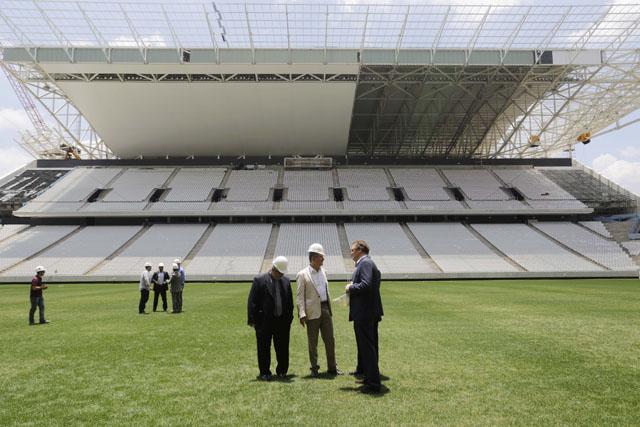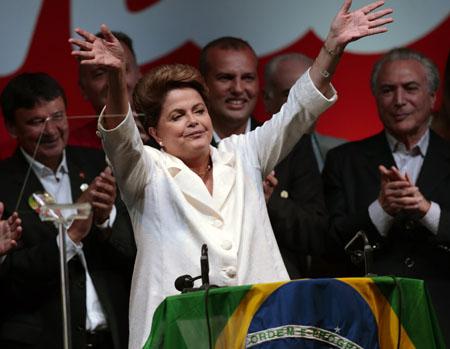You are here
Brazil in last-minute rush to be ready for World Cup
By Reuters - Jun 04,2014 - Last updated at Jun 04,2014
SAO PAULO — With just over a week to go before the World Cup kicks off, Brazil is racing to get its stadiums, airports, roads and phone networks ready before hundreds of thousands of football fans descend on the country.
Airports in nearly all 12 host cities are swarmed with construction workers laying parking lots, installing check-in counters and kicking up clouds of dust with long-delayed expansions.
Workers at several stadiums are still struggling to set up cell phone networks that can withstand tens of thousands of smartphones. Temporary bleachers in Sao Paulo's stadium, which will host the opening game on June 12, have still not been tested under the full weight of fans.
After more than 13 years of intermittent construction, trains are finally making test runs on a metro that will deliver ticket holders to the stadium in the northeastern city of Salvador.
Only about half the projects promised for the World Cup have been delivered and many of those are only partly done, souring the mood in a country obsessed with football but increasingly sceptical about the benefits of hosting the show.
The late rush means most of the critical infrastructure will be in place and few doubt that the first World Cup in Brazil since 1950 will be one to remember.
President Dilma Rousseff promises Brazil will be fully ready on time even as she recognises delays with some big projects.
"Nobody does a [subway] in two years. Well, maybe China," she said with a smile during a meeting with foreign journalists on Tuesday night, calling delays "the cost of our democracy".
Still, frustrations over broken budgets, sloppy planning and missed opportunities to build a more enduring legacy fuelled a wave of protests last year and still loom over the World Cup.
The cycle of dire warnings and a late scramble to get ready is a familiar one ahead of the World Cup and the Olympics, and host nations usually manage to silence sceptics in the end. Even by those standards, though, Brazil is cutting it close.
FIFA President Sepp Blatter said in January that Brazil was further behind than any other host country he could recall with just five months to go.
Now he and other FIFA officials are putting on their game faces and adopting a more optimistic tone.
"I am sure it will be a great, great success," Blatter said. "The Brazilian spirit of the game and the Brazilian ability to play football makes this World Cup very, very special."
Throughout the country, Brazil's flag and iconic yellow jerseys are multiplying on the streets. Blending dogged pride with defiance of sporadic protests, some Brazilians have taken to Twitter with the hashtag #VaiTerCopaSim — or "Yes, there will be a World Cup".
The Brazilian team, which has already won the World Cup a record five times, is widely favoured to win again. If it does, home fans will put on a party to remember.
Not ready yet
For organisers, however, it is still too early to celebrate. Workers in Sao Paulo and Natal have spent the last week installing seats in stadiums that were supposed to be ready in December.
The Sao Paulo Stadium staged a weekend game to test its readiness but used about half the seating capacity and just a quarter of the temporary bleachers, some of which had not cleared safety checks.
Pick-up and drop-off areas at the airport in Belo Horizonte have been redirected around a crane. Workers in orange jumpsuits mingle with travellers in the main concourse.
In Manaus, passengers complain of the clouds of dust from the airport's ongoing expansion, while tractors are still working on new parking lots outside.
Even at new airports where the dust has settled, terminals promised for the World Cup may not be used for the tournament because they were delivered with so little time for inspection.
The second of two new terminals promised for the World Cup in the capital Brasilia was delivered last month but regulators have not yet authorised it for operation. A new airport west of Natal was only cleared for international arrivals on Tuesday.
Getting to and from some airports is also a headache as projects meant to smooth the connection to downtown areas are instead snarling traffic.
In Curitiba, 16km of the road to the airport is now a construction zone funnelling cars from four lanes to as few as one, doubling or tripling what had been a 30-minute ride.
A light rail project promised for the World Cup in Cuiaba will not enter service this year, but dozens of workers still swarm the work site where rails pass outside the airport. Driving from there to the city centre can now take up to two hours.
In some places workers have even reversed course, filling in trenches they had dug in order to cover up work sites with squares of grassy sod.
Determined to highlight signs of progress, Rousseff has inaugurated a series of high-profile public work projects, although construction continues on many of them
On Sunday, she celebrated the opening of a $700 million bus corridor across Rio de Janeiro, running from the airport at the north end of town to a booming beachside borough in the south. Only half the stations are open and just two of a planned seven bus lines will be ready in time for the World Cup.
At the expanded airport terminal Rousseff visited earlier in the day, construction was covered over with plywood barriers.
She played down the World Cup connection, saying they are long-term investments. "We're not making airports or projects of this scale for the World Cup. We do it for all Brazilians."
Still, the tournament offered a clear deadline for big transportation programmes such as Salvador's metro, which languished for years after work first started in 2000.
Tests on the long-awaited metro line were suspended after a worker died in an accident and service is now set to begin June 11, on the eve of the tournament opener.
Related Articles
Rio de Janeiro’s legendary Maracanã Stadium was in a frenzy. Brazil had trounced the Spanish world champions. Yet 73,000 football fans could scarcely send a text message to celebrate.
Brazil is running out of time. World Cup organisers will mark 100 days to go on Tuesday with a lot of work still to be done on stadiums and infrastructure in the 12 host cities.
Despite opposition from nearly half of Brazil's voters, leftist President Dilma Rousseff won re-election on Sunday and will have another four years to try to revive growth in a once-booming economy gone stagnant.


















